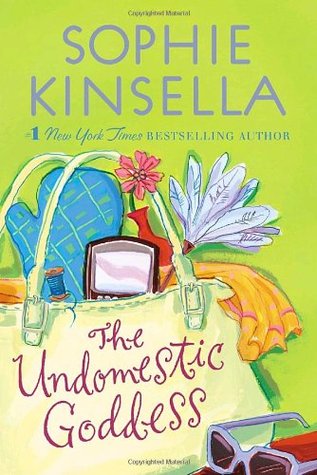 Okay, so, Sophie Kinsella is pretty much the epitome of the "chick lit" genre. According to Goodreads, chick lit is "genre fiction which addresses issues of modern womanhood, often humorously and lightheartedly." But that's a very generous definition and is more like generic women's fiction. Chick lit more specifically tends to focus heroines without a brain in their heads, who get into all sorts of trouble because they can't communicate adequately, proceed to blame all those problems on other people instead of themselves, and then frequently turn to drinking to "solve" said problems, until they stumble across a hunky guy who sweeps them off their feet and inspires them to fix themselves. It's often incredibly painful to read.
Okay, so, Sophie Kinsella is pretty much the epitome of the "chick lit" genre. According to Goodreads, chick lit is "genre fiction which addresses issues of modern womanhood, often humorously and lightheartedly." But that's a very generous definition and is more like generic women's fiction. Chick lit more specifically tends to focus heroines without a brain in their heads, who get into all sorts of trouble because they can't communicate adequately, proceed to blame all those problems on other people instead of themselves, and then frequently turn to drinking to "solve" said problems, until they stumble across a hunky guy who sweeps them off their feet and inspires them to fix themselves. It's often incredibly painful to read.It's also one of the featured genres in the Unapologetic Romance Readers' 2017 reading challenge (info here). So, when it came time to put forth nominations for our February book of the month, I tossed Kinsella into the ring. If I was going to read chick lit, I was going to bring fellow sufferers along for the ride. And it won! Apparently others felt the same way, and someone also mentioned that, as far as chick lit goes, Undomestic Goddess isn't that bad--probably aided by the fact that it's a standalone novel and not part of a series, which would just draw out the suffering.
So off I went, along with heroine Samantha Sweeting, a high-powered lawyer at one of London's top law firms. She's on track to become a partner, the thing she's always dreamed of and has dedicated the last seven years of her life to. And then, following a terrible birthday, she discovers that she's made a terrible mistake, one that could cost her firm fifty million pounds...and before she can fix it, everyone else has found out, too. In shock, Samantha flees London and ends up in a little village where, looking for a drink of water and some headache medicine, she's mistaken as an applicant for a housekeeper position for the Geigers. Trish and Eddy Geiger have a ton of money and not an ounce of sense in their heads. They're a perfect match for Samantha, who has a ton of money and law sense but not an ounce of common sense. Seriously. The woman can't make anything more complicated than toast. She doesn't know the difference between flour and baking soda. She can't iron a shirt, or even turn on a washing machine. I have no idea how she survived to adulthood, honestly. And yet she, of course, does not enlighten the Geigers to their mistake, and decides she's just going to go along with the whole thing. Even though she has no idea what she's doing.
Luckily, this entire "completely useless" phase doesn't last too long. Nathaniel, the Geiger's gardener, quickly figures out that Samantha is faking, and out of the goodness of his heart offers to get his mother to help Samantha figure out what she's doing. Samantha is evidently actually gifted when it comes to cooking, because she of course learns to cook gourmet meals in the space of two days, in addition to learning to do everything else that she never learned to do as a child or adolescent or even adult. And of course she gets close to Nathaniel to boot. But despite Samantha doing her best to let go of her huge mistake and the disaster it left in its wake, she can't help but picking at it, and picking at it, until she finds something that might put an end to her little idyll in the country... But is that a good thing or a bad thing?
So, after Samantha learned to be a functional human being, the book got a lot bigger. She definitely still made some bad decisions, like not telling anyone the truth about how she got there (instead she lets everyone think she's fleeing an abusive relationship) but, to some degree, I can empathize with her decisions. I definitely still think they're stupid, but I can totally understand her feeling like the events in London are seen through a fog or feel like a bad dream, and wanting to just not think about it as much as possible. I think that empathy really helped carry me through the book. Also, Nathaniel was pretty great. He's a gardener, but he also has strong ties to a family business, and I think his reactions to Samantha's revelations and decisions later in the book were what they should have been for this book, without being totally unrealistic. Also, I think Kinsella does a good job of creating the little town that Samantha ends up in (I can't remember the name of it) and making it into an escape...while still showing that it's not all sunshine and daisies.
So, yes. This book got off to a very rough start. It had some very over-the-top moments. But I think its core was a strong story, and it was enjoyable. Would I read it again? Hm... Maybe, actually. But it'd be like a fluffy summer beach read, and I'm not sure it's turned me back onto Kinsella's other works.
3 stars out of 5.
No comments:
Post a Comment